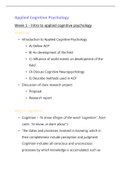Applied Cognitive Psychology
Week 1 – Intro to applied cognitive psychology
objectives
• Introduction to Applied Cognitive Psychology
• A) Define ACP
• B) Hx development of the field
• C) Influence of world events on development of the
field
• D) Discuss Cognitive Neuropsychology
• E) Describe methods used in ACP
• Discussion of class research project
• Proposal
• Research report
What is cognition?
• Cognition – To know (Origin of the word “cognition”, from
Latin, “to know, or learn about”.)
• “the states and processes involved in knowing, which in
their completeness include perception and judgment.
Cognition includes all conscious and unconscious
processes by which knowledge is accumulated, such as
, perceiving, recognizing, conceiving, and reasoning. Put
differently, cognition is a state or experience of knowing
that can be distinguished from an experience of feeling or
willing.” - Encyclopedia Britannica
• “...the term "cognition" refers to all processes by which the
sensory input is transformed, reduced, elaborated, stored,
recovered, and used. It is concerned with these processes
even when they operate in the absence of relevant
stimulation, as in images and hallucinations... Given such a
sweeping definition, it is apparent that cognition is
involved in everything a human being might possibly do;
that every psychological phenomenon is a cognitive
phenomenon.” – Neisser (coined the term “Cognitive
Psychology”)
Cognitive psychology
• You should have a basic understanding of what cognitive
psychology is.
• CP emerged as a response to behaviourism.
• Seen as a means to address internal mental processes.
• “Cognitive psychology is the study of how the brain
processes information.” – Groome & Eysenck (2016, p. 1).
, • Main processes involved in cognition: perception,
learning, memory storage, retrieval, language, and
thinking reasoning.
• Types of information that are subject to cognitive
processing: visual, auditory, tactile, gustatory, or olfactory
information
• Types of information are sensed (acquired), they are then
integrated into existing networks and systems of thought
in the brain where they are then subjected to cognitive
processing.
Early cognitive research
• First attempts to investigate cognitive processes in a
scientific way was in the early 19th century:
• Wilhelm Wundt (1874) – Father of experimental
psychology; attention and perception; reaction time tasks.
• Francis Galton (1879) – Mental imagery and associative
thinking.
• Hermann Ebbinghaus (1885) – Learning and memory
encoding.
• Edward Thorndike (1914) – Behavioural conditioning – law
of effect.
, • Attempted to unpack basic cognitive processes and create
theories around their findings.
• What followed was a proliferation of new types of
experiment and research design focused on the scientific
exploration of the human mind.
What is APPLIED cognitive psychology
• ACP: Processes in context, and out of the lab
• The application of CP in the real world:
• “It is concerned with the investigation of how
cognitive processes affect our behaviour and
performance in real-life settings”.
• Examples:
• Sustained attention of a radar operator
• Student study habits for better memory retention
• Reliability of eyewitness accounts
Early *applied* cognitive research
• Early cognitive research in real-world settings:
• Francis Galton (1879) – First scientific study of
autobiographical memory: tested people’s memory for




